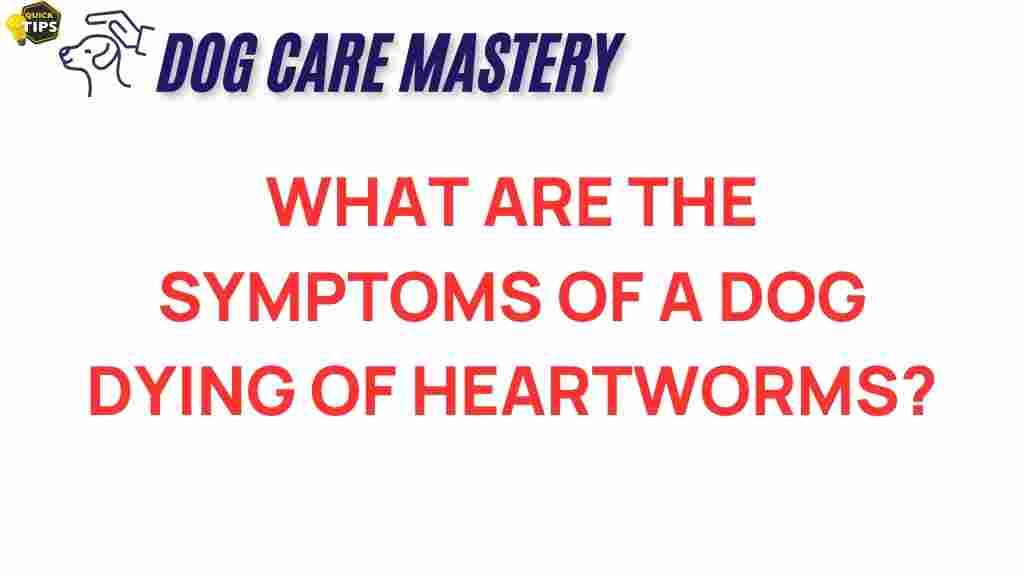Recognizing the Signs of Heartworms in Dogs
Heartworms are a serious and potentially fatal condition that affects dogs. Caused by parasitic worms transmitted through mosquito bites, these worms can lead to severe health issues if not diagnosed and treated promptly. As a responsible dog owner, it’s essential to be aware of the signs of heartworms and how to recognize when your furry friend may be suffering from this condition. This article will guide you through the symptoms of heartworm disease, how to recognize when your dog is in distress, and what steps you can take to ensure their health and well-being.
Understanding Heartworms
Heartworms (Dirofilaria immitis) are long, spaghetti-like worms that can grow up to a foot in length and live in the heart, lungs, and blood vessels of infected dogs. This parasitic infection can cause significant damage to the dog’s organs and can even lead to death if left untreated. Heartworm disease is prevalent in many parts of the United States, making it crucial for pet owners to understand the risks and preventive measures.
Common Symptoms of Heartworm Disease
Recognizing the signs of heartworm disease is critical for timely intervention. The symptoms can vary based on the severity of the infection. Here are some common signs to watch for:
- Coughing: Persistent coughing, especially during exercise, can indicate heartworm infection.
- Fatigue: Dogs may become unusually tired and lethargic, showing a lack of interest in play or walks.
- Weight Loss: Unexplained weight loss can be a sign of advanced heartworm disease.
- Swollen Abdomen: This can occur due to fluid accumulation caused by heart failure.
- Difficulty Breathing: Labored breathing or shortness of breath is a serious symptom that requires immediate veterinary attention.
- Fainting or Collapse: In severe cases, dogs may faint or collapse due to lack of blood flow to vital organs.
Step-by-Step Process: How to Recognize a Dog Dying from Heartworms
If you suspect your dog may be suffering from heartworms, it’s important to follow these steps for recognition and action:
Step 1: Observe Behavioral Changes
Keep a close eye on your dog’s daily behavior. Note any changes in energy levels, interest in activities, and appetite. If your dog seems more tired than usual or is reluctant to engage in their favorite activities, it may be a sign of distress.
Step 2: Monitor Physical Symptoms
Pay attention to physical symptoms such as coughing, difficulty breathing, or a swollen abdomen. These signs can indicate that the heartworms are causing significant strain on your dog’s body.
Step 3: Schedule a Veterinary Visit
If you notice any of the symptoms mentioned above, it’s crucial to schedule an appointment with your veterinarian as soon as possible. They will perform a thorough examination, which may include:
- Blood Tests: To check for the presence of heartworm proteins.
- X-rays: To assess heart and lung health.
- Ultrasound: To detect the presence of adult heartworms.
Step 4: Follow Treatment Protocols
If your dog is diagnosed with heartworms, your veterinarian will outline a treatment plan. Treatment typically involves:
- Medication: Administering specific medications to kill adult and juvenile heartworms.
- Restricting Activity: Limiting exercise to reduce the risk of complications during treatment.
- Follow-up Care: Regular check-ups to monitor progress and ensure recovery.
Troubleshooting Tips for Dog Owners
As a dog owner, it’s essential to be proactive in your approach to preventing heartworms. Here are some troubleshooting tips:
- Regular Vet Visits: Schedule annual check-ups with your veterinarian to monitor your dog’s health and test for heartworms.
- Preventive Medication: Administer heartworm preventive medication as prescribed by your veterinarian. This is crucial in areas where heartworms are prevalent.
- Keep Your Yard Mosquito-Free: Take steps to reduce mosquito populations in your yard, such as eliminating standing water and using mosquito repellents.
- Educate Yourself: Stay informed about the risks and symptoms of heartworm disease to catch any issues early.
Conclusion
Heartworms are a serious threat to your dog’s health, and recognizing the signs of heartworm disease is essential for timely treatment. By being vigilant about your dog’s behavior and health, scheduling regular veterinary check-ups, and administering preventive measures, you can help protect your furry friend from this dangerous condition. If you suspect your dog might be suffering from heartworms, don’t hesitate to reach out to your veterinarian for advice and assistance. Remember, early detection and treatment are key to a successful outcome.
For more information on heartworm prevention and treatment, you can visit the American Heartworm Society. If you’re looking for tips on how to keep your pet healthy, check out our article on dog care best practices.
This article is in the category Health and created by dogcaremastery Team
